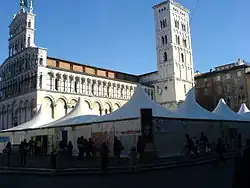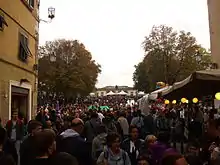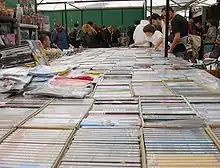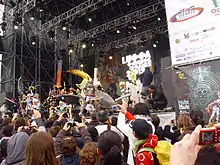43°48′N 10°30′E / 43.8°N 10.5°E
| Lucca Comics and Games | |
|---|---|
 A Lucca Comics pavilion, near the San Michele in Foro basilica, in 2007 | |
| Status | Active |
| Location(s) | Lucca |
| Country | Italy |
| Inaugurated | 1965 |
| Attendance | 319,926 in 2022[1] [2] |
| Organized by | Comune of Lucca, through the limited company "Lucca Crea Srl"[3], in which flew the previous Srl " Lucca Comics & Games" and "Lucca Polo Fiere e Congressi" [4] |
| Website | luccacomicsandgames.com |
Lucca Comics & Games is an annual comic book and gaming convention in Lucca, Italy, traditionally held at the end of October, in conjunction with All Saints' Day. It is the largest comics festival in Europe, and the second biggest in the world after the Comiket.
History


The Salone Internazionale del Comics ("International Congress of Comics") was launched by a Franco-Italian partnership, consisting of Italians Rinaldo Traini and Romano Calisi and Frenchman Claude Moliterni (forming the International Congress of Cartoonists and Animators) in 1965 in Bordighera.[5][6] In 1966, it moved to a small piazza in the center of Lucca, and grew in size and importance over the years.
Funding issues reduced the frequency of the festival to every two years, beginning in 1977. In the 1980s, the festival was moved to a sports center outside the city walls, where it remained until 1992, when it was moved to another city (funding issues also forced the cancellation of the 1988 festival).
After the Salone internazionale del Comics ended in Lucca, city leaders launched a new convention called simply Lucca Comics that was a reprise of the old one. In 1996, it changed its name to Lucca Comics & Games. The festival attracted 50,000 attendees in 2002.
Meanwhile, the Salone internazionale del Comics was held in Rome from 1995 to 2005. In 2006, for the festival's 40th anniversary, the Salone merged with Lucca Comics & Games and moved back to Lucca's city center, with numerous tents and pavilions arranged in different squares within and outside the walls of the medieval city.
In 2022 the festival sold 319,926 tickets, beating the record established in 2016, when it had attracted 270,000 attendees.
Awards


Comics awards
From 1970 to 2005, the festival presented the Yellow Kid Award — named in honor of Richard F. Outcault's seminal comic strip character The Yellow Kid — in such categories as Best Cartoonist, Best Illustrator, Best Newcomer, Best Foreign Artist, and Lifetime Achievement. Yellow Kid Awards were also presented to publishers, both domestic and foreign.
The festival also (since 1967) presents a special award called the Gran Guinigi Award (named after Lucca's Guinigi Tower).
In 2020, as the festival redubbed itself Lucca Changes amidst a shift to virtual programming during the COVID-19 pandemic,[7] the awards shifted to a new system under the umbrella term Lucca Comics Awards, consisting of 9 categories (3 Yellow Kids, 5 Gran Guinigis, and one Stefano Beani Award named for a former festival director), "regardless of nationality, editorial format or distribution method".[8]
Yellow Kid Award recipients
- 1970: Johnny Hart, for Best Cartoonist of the Year — first time this award was given to an American cartoonist[9]
- 1971: Mauricio de Sousa, for Best Cartoonist of the Year. His work, the first edition of Monica's Gang, also won Best Publication.
- 1972:
- Hergé, for "una vita per il cartooning" (lifetime award)[10]
- Tintin magazine, for Best Publication
- 1973: Guido Buzzelli, for Best Illustrator and Author
- 1974: Vaughn Bodē
- 1975:
- Jean Giraud, for Best Foreign Artist[11]
- Dan O'Neill
- Frank Hampson, declared Prestigioso Maestro and the best writer and artist of strip cartoons since the end of the Second World War
- 1977: Fred
- 1978:
- Bobby London, Best Artist-Writer
- Milo Manara[12]
- Carlos Trillo, for Best International Author[13]
- 1980:
- Didier Comès, for Best Foreign Artist
- Jean Giraud, for Best Foreign Author
- Frank Margerin
- 1982: Art Spiegelman, for Best Foreign Author[14]
- 1983:
- 1984: Strip Art Features, for Best Foreign Comics Publisher[17]
- 1986: Bill Sienkiewicz, for "bridging the gap between American and European artistic sensibilities"[18][19]
- 1990:
- Neil Gaiman[20]
- Massimo Rotundo, for Best Italian Comics Artist
- Leonardo Ortolani, for Best Newcomer
- 1993:
- 1998: Paul Gillon
- 1999: Jeff Smith, Best Author[22]
Gran Guinigi recipients
- 1969: Hugo Pratt, for Una ballata del mare salato[23]
- 1975: Dan O'Neill for The Penny-Ante Republican[24]
- 1978: Carlos Trillo[13]
- 1986: Bill Sienkiewicz[18][19]
- 1990: Massimo Rotundo
- 2001: Aldo Di Gennaro
- 2005: Grazia Nidasio
- 2006: Gino D'Antonio
- 2007: Sergio Toppi
- 2008: Vittorio Giardino
- 2009: Robert Crumb
- 2010: Jiro Taniguchi
- 2011: Enrique Breccia
- 2012: Hermann Huppen
- 2013: Silver (Guido Silvestri)
- 2014: Gipi
- 2015: Alfredo Castelli
- 2016: Albert Uderzo
- 2017: José Muñoz
- 2018: Leiji Matsumoto
- 2019: Chris Claremont
- 2020: AkaB (Gabriele Di Benedetto)
- 2021: Lorenzo Mattotti
- 2022: Riyoko Ikeda and Milo Manara
Games awards
- 1999: Murat CELEBI's [skirmish miniature game [CONFRONTATION], for Best of Show.
- 2002: Emiliano Sciarra's Wild West-themed card game Bang!, for Best of Show
- 2003: Sine Requie, for Best Italian Game
- 2004: Helena Bulaja's Priče iz davnine ("Croatian Tales of Long Ago"), for Best Multimedia Award
- 2010:
- 7 Wonders, for Best Card Game
- Eden: the Deceit, Side Award for Best Game Mechanics
- 2011:
- Vincent Baker's Apocalypse World, for RPG of the Year
- Twilight Struggle, for Best of Show in Boardgame for Experts[25]
References
- ↑ "Lucca Comics & Games 2002, grande successo di pubblico: un'altra incredibile edizione è giunta al termine". Il Quotidiano Italiano (in Italian). 2 November 2022. Retrieved 2 November 2022.
- ↑ "Lucca Comics & Games, il ritorno della community delle community è da record" (PDF). Lucca Comics & Games (in Italian). 1 November 2022. Archived (PDF) from the original on 2 November 2022. Retrieved 3 November 2022.
- ↑ Lucca Crea
- ↑ Lucca Comics & Games Srl - Chi siamo
- ↑ "Lucca 9", Bang! #11 (1974), p. 55.
- ↑ Pasamonik, Didier. "Disparition de Claude Moliterni, fondateur du Festival d'Angoulême", ActuaBD (21 January 2009). (in French)
- ↑ "Che cos'è Lucca Comics & Games - edizione Changes". Retrieved 3 June 2021.
- ↑ Bottalico, Domenico (24 October 2020). "Lucca Comics Awards i nuovi "Oscar del Fumetto" a Lucca Changes". Tom's Hardware. Retrieved 3 June 2021.
- ↑ Nordling, Lee. Your Career in the Comics (Newspaper Features Council (U.S.)/Andrews McMeel Publishing, 1995), p. 235.
- ↑ "History of the Lucca festival". 1972. Retrieved 15 July 2006.
- ↑ "11° Salone Internationale del Comics, del Film di Animazione e dell'Illustrazione" (in Italian). immaginecentrostudi.org.
- ↑ Clute, John and John Grant. The Encyclopedia of Fantasy (Macmillan, 1999), p. 621
- 1 2 "13 Salone Internazionale dei Comics" (in Italian). Centro Studi Iconografici.
- ↑ Traini, Rinaldo (1982). "15° SALONE, 1982" (in Italian). Immagine-Centro Studi Iconografici. Archived from the original on 27 February 2011.
- ↑ Gilbert Hernandez entry, Who's Who of American Comic Books, 1928-1999. Accessed 15 June 2015.
- ↑ "Hernandez Brothers Win Award", The Comics Journal #95 (Feb. 1985), p. 21.
- ↑ Immagine-Centro Studi Iconografici. "16° SALONE INTERNAZIONALE DEI COMICS, 1984" (in Italian).
- 1 2 "Bill Sienkiewicz Awards, Exhibits". Wordsandpictures.org. Archived from the original on 7 February 2012.
- 1 2 "17° SALONE, 1986" (in Italian). Immagine-Centro Studi Iconografici. Archived from the original on 7 February 2012. Retrieved 16 June 2015.
- ↑ "Awards and Honors", NeilGaiman.com. Accessed 16 June 2015.
- 1 2 3 4 Origa, Graziano. "Lucca Exhibition is Un Grande Successo: Yellow Kid Awards for John Byrne, François Boucq, Frank Thomas, and Ollie Johnston", The Comics Journal #156 (Feb. 1993), p. 41.
- ↑ Duncan, Randy, and Matthew J. Smith. Icons of the American Comic Book: From Captain America to Wonder Woman, vol. 1, (ABC-CLIO, 2013), p. 98
- ↑ Centro Studi Iconografici. "5 Salone Internazionale dei Comics" (in Italian).
- ↑ O'Neill entry, Who's Who of American Comic Books, 1928-1999. Accessed 8 October 2016.
- ↑ "Best of Show: i vincitori". Lucca Comics & Games 2011 (in Italian). Retrieved 26 August 2019.